虚拟语气unit 1语法1
(完整版)虚拟语气用法小结

虚拟语气用法小结一、虚拟语气在条件从句中的用法条件句有两类,一类是真实条件句,一类是虚拟条件句。
如果假设的情况是有可能发生的,就是真实条件何.在这种真实条件句中的谓语用陈述语气。
如: If it doesn't rain tomorrow, we will go to the park.如果假设的情况是过去或现在都不存在的,或将来不大可能发生的,则是虚拟条件句。
如: If he had seen you yesterday, he would have asked you about it。
如果他昨天见到你,他会问你这件事的。
(事实上他昨天没见到你,因此也未能问你这件事。
)1。
在含有虚拟条件句的复合句中,主句和从句的谓语都要用虚拟语气。
虚拟条件从句和主句的动词形式列表如下:2。
错综时间条件句:有时条件从句中的动作和主句中的动作发生的时间不一致(表示错综时间的虚拟语气),这时动词的形式要根据它所表示的时间加以调整。
If you had listened to the doctor, you would be all right now。
如果你当初听了医生的话,身体现在就好了。
(从句动作指过去,主句动作指现在)3。
省略连词if (倒装)。
在书面语中,如果虚拟条件从句中有were,had 或 should,可以把if省略,把这几个词放到主语之前,构成主谓倒装.Should he come (If he should come), tell him to ring me up.Were I you (If I were you), I would not do it。
Were I to meet him tomorrow (= if I were to met him tomorrow), I should ask him about it。
要是我明天见到他,我就会问他这件事的。
Had I had the money last year (= if I had had the money last year), i would have bought the house. 如果我去年有了这笔钱,我就买那所房子了.Should there be any trouble with the boiler, the automatic controlling unit would cut off the fuel oil supply. 假如锅炉出问题的话,自控装置会自动切断燃油的供给.4。
2020_2021学年高中英语课时作业(二)Unit1ArtSectionⅡGrammar—虚拟语气(一)(含解析)新人教版选修6
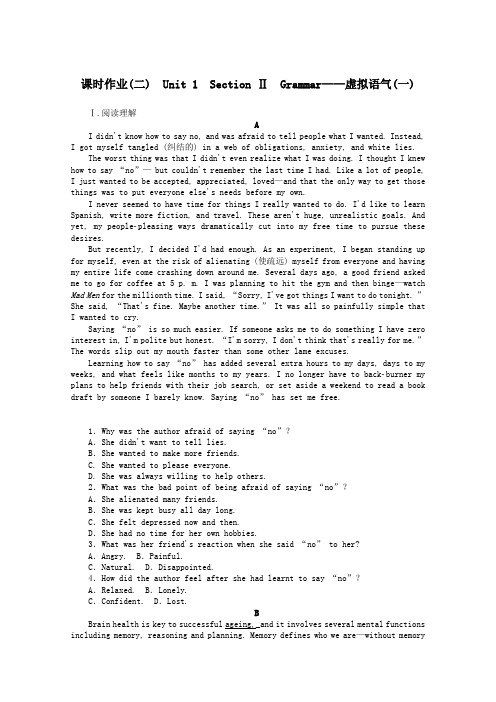
课时作业(二) Unit 1 Section ⅡGrammar——虚拟语气(一)Ⅰ.阅读理解AI didn't know how to say no, and was afraid to tell people what I wanted. Instead, I got myself tangled (纠结的) in a web of obligations, anxiety, and white lies.The worst thing was that I didn't even realize what I was doing. I thought I knew how to say “no”— but couldn't remember the last time I had. Like a lot of people, I just wanted to be accepted, appreciated, loved—and that the only way to get those things was to put everyone else's needs before my own.I never seemed to have time for things I really wanted to do. I'd like to learn Spanish, write more fiction, and travel. These aren't huge, unrealistic goals. And yet, my peoplepleasing ways dramatically cut into my free time to pursue these desires.But recently, I decided I'd had enough. As an experiment, I began standing up for myself, even at the risk of alienating (使疏远) myself from everyone and having my entire life come crashing down around me. Several days ago, a good friend asked me to go for coffee at 5 p. m. I was planning to hit the gym and then binge—watch Mad Men for the millionth time. I said, “Sorry, I've got things I want to do tonight. ” She said, “That's fine. Maybe another time.” It was all so painfully simple that I wanted to cry.Sayi ng “no” is so much easier. If someone asks me to do something I have zero interest in, I'm polite but honest. “I'm sorry, I don't think that's really for me.” The words slip out my mouth faster than some other lame excuses.Learning how to say “no” has add ed several extra hours to my days, days to my weeks, and what feels like months to my years. I no longer have to backburner my plans to help friends with their job search, or set aside a weekend to read a book draft by someone I barely know. Saying “no” h as set me free.1.Why was the author afraid of saying “no”?A.She didn't want to tell lies.B.She wanted to make more friends.C. She wanted to please everyone.D. She was always willing to help others.2.What was the bad point of being afraid of saying “no”?A.She alienated many friends.B.She was kept busy all day long.C.She felt depressed now and then.D.She had no time for her own hobbies.3.What was her friend's reaction when she said “no” to her?A.Angry. B.Painful.C.Natural. D.Disappointed.4.How did the author f eel after she had learnt to say “no”?A.Relaxed. B.Lonely.C.Confident. D.Lost.BBrain health is key to successful ageing,_and it involves several mental functions including memory, reasoning and planning. Memory defines who we are—without memorywe have no past, cannot plan for the future and are unable to enjoy the present. Our reasoning and planning skills help us create and maintain healthy lifestyle habits that protect our bodies and minds.People are living much longer than ever before. Those born in 1900 would have been lucky to reach their 50th birthday. Today, life expectancy in many countries exceeds 80, but unfortunately agerelated diseases such as Alzheimer's and diabetes can diminish quality of life.As we age, brain cells that normally fight off infection and repair tissue begin to attack healthy brain cells. This causes inflammation (炎症) and can lead to cognitive deficits and disease. But adopting healthy lifestyle habits, such as eating fish, getting a good night's sleep and doing physical exercise, can slow and even reverse the process.The typical 45yearold has worse memory than the 25yearold, and our brains will continue to decline if we do nothing to protect them. However, if we intervene (干预)early, we can slow the decline. It's always easier to protect a healthy brain than to try to repair damage once it is extensive.Although there is a genetic component to healthy ageing, lifestyle habits may be more critical than genes. The landmark MacArthur Studies of Successful Ageing showed t hat, on average, nongenetic factors are more important than genetics in determining how well and long we live, suggesting that we have more control than we realize over remaining healthy as we get older.5.What does the underlined word “ageing” mean in the first paragraph?A.The process of getting old.B.Mental functions.C.Life expectancy.D.Healthy lifestyle.6.What can we do to slow the decline of our brains?A.Enjoying the present.B.Staying in a good mood.C.Working as long as possible.D.Adopting healthy lifestyle habits.7.What does MacArthur Studies of Successful Ageing suggest?A.Agerelated diseases affect our quality of life.B.Genetic factors determine how well we live.C.We can do something to live better and longer.D.Sometimes we don't know how to keep healthy.8.What is the main idea of the text?A.Daily habits determine your longevity.B.You should protect your brains early.C.Good health results from right food.D.Body exercise also benefits mental health.Ⅱ.完形填空Cathy and I met a few days after I first arrived in China. I was walking around the English academy which had __1__ me, introducing myself to my new colleagues, most of __2__ were Chinese. I entered Cathy's __3__, saw her, and immediately felt some __4__ and happy emotions (情感). She __5__ so kind, yet professional. I couldn't stop smiling like a (n) __6__. After introducing ourselves and exchanging __7__ questions.I asked whether she knew anyone who could __8__ me in Chinese. She said she could, and agreed to meet outside work.We sometimes exchanged nonromantic texts in the evening. After a couple __9__,I invited her to my apartment. I was very nervous. Later, I asked if she would consider __10__ me. She didn't immediately __11__, but said she would tell me the next day.I found it very difficult to __12__, but I did.This was a __13__ difference. In American culture, starting to date someone is not a big, important __14__, but I think in Chinese culture it is. Well, she said “yes”, and so we spent lots of time together, and __15__ love. I asked her to __16__ me about 6 or 7 months later.We had a Chinese style __17__ in Cathy's hometown. My parents came, and it was great. It went really __18__. Everyone was very __19__. It was a very fun and interesting __20__ for me, very different from a Western style wedding.1.A.hired B.firedC.educated D.hated2.A.which B.themC.whom D.what3.A.life B.classroomC.bedroom D.heart4.A.interesting B.awkwardC.disappointed D.looked5.A.talked B.taughtC.smelled D.looked6.A.father B.actorC.fool D.genius7.A.basic B.seriousC.practical D.strange8.A.match B.persuadeC.communicate D.tutor9.A.hours B.weeksC.years D.decades10.A.dating B.teachingC.cheering D.praising11.A.leave B.argueC.agree D.answer12.A.sleep B.laughC.wait D.complain13.A.temporary B.nationalC.cultural D.political14.A.risk B.decisionC.trouble D.fault15.A.traded B.fell inC.talked about D.broke in16.A.marry B.wait forC.test D.go with17.A.breakup B.partyC.gettogether D.wedding18.A.steady B.wellC.annoying D.fast19.A.curious B.politeC.sad D.happy20.panion B.lessonC.experience D.story课时作业(二)Ⅰ.阅读理解A【语篇解读】本文是一篇记叙文。
高一英语各单元语法归纳
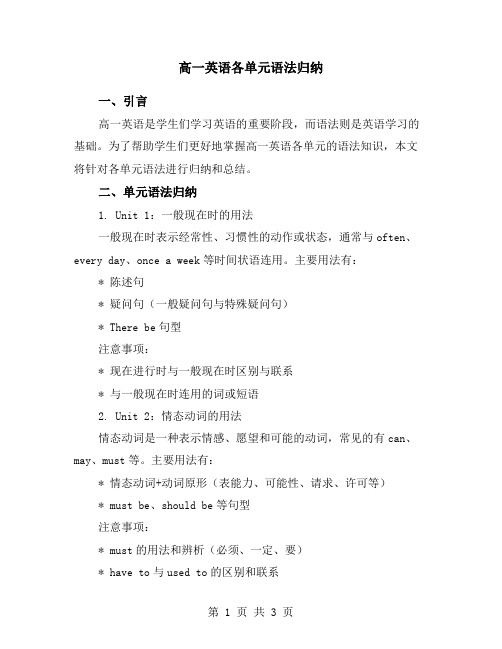
高一英语各单元语法归纳一、引言高一英语是学生们学习英语的重要阶段,而语法则是英语学习的基础。
为了帮助学生们更好地掌握高一英语各单元的语法知识,本文将针对各单元语法进行归纳和总结。
二、单元语法归纳1. Unit 1:一般现在时的用法一般现在时表示经常性、习惯性的动作或状态,通常与often、every day、once a week等时间状语连用。
主要用法有:* 陈述句* 疑问句(一般疑问句与特殊疑问句)* There be句型注意事项:* 现在进行时与一般现在时区别与联系* 与一般现在时连用的词或短语2. Unit 2:情态动词的用法情态动词是一种表示情感、愿望和可能的动词,常见的有can、may、must等。
主要用法有:* 情态动词+动词原形(表能力、可能性、请求、许可等)* must be、should be等句型注意事项:* must的用法和辨析(必须、一定、要)* have to与used to的区别和联系3. Unit 3:被动语态的用法被动语态表示主语是动作的承受者,常用的有be done、get done等形式。
主要用法有:* 被动语态的结构(be done)和形式(be being done)* 与被动语态连用的动词类型(及物动词)* 主动语态变被动语态的步骤和注意事项4. Unit 4:定语从句的用法定语从句是在句子中起修饰或限制作用的关系词,常用的关系词有that、which、who等。
主要用法有:* 关系词的种类和用法(that、which、who等)* 关系词的省略和替代(关系代词省略和关系副词替代)* 定语从句与同位语从句的区别和联系注意事项:* 限制性和非限制性定语从句的区别和联系* 关系代词that与which的区别和适用范围5. Unit 5:虚拟语气用法虚拟语气用于表达某种非真实条件状语从句,常见的有wish、if only等。
主要用法有:* 虚拟语气的形式和用法(建议、要求、建议未实现等)* 与虚拟语气连用的从句类型(名词性从句、定语从句)和从句引导词类型。
人教新课标选修6 unit1 art -If虚拟语气

If I …, I would ….
travel around the world
What would you do if you had one million dollars?
If I …, I would ….
give it to the zoo
What would you do if you had one million dollars?
Sentence completion (4’)
• If you _____________________, had followed my advice you would have seized the chance and got the qualification to work in the big company. (follow)
If I …, I would ….
give it to charity (慈善机构)
Let’s play a game!
Let’s make up an interesting story together!
Model
Student 1: If I were a fish, I would swim in the sea. Student 2:If I swam in the sea, I would meet many fish. Student 3: If I met many fish, I would give them food. Student 4: If I gave them food, … would …. Student 5:
If I am free, I will visit you.(真实条件句)
If I were a bird, I would fly into the sky.
中职英语Unit1虚拟语气讲解课件

The person who were chosen for the position has since left the company. (Contrary to fact - the chosen person is no longer with the company)
Usage in appositive clauses
Usage
In complex time conditional sentences, the subjunctive mood is used in the "if" clause to express a situation that does not actually exist or might not happen. It is used to create a hypothetical situation for comparison or contrast with the actual situation.
The present subjunctive
This form uses the base form of the verb, regardless of the subject's number or gender. For example, "I suggest that he eat healthier."
Example
It is important that he be welltrained for the job. (Suggestion - it is recommended that he be welltrained)
Usage in object clauses
Unit1虚拟语气]修改版讲解及练习
![Unit1虚拟语气]修改版讲解及练习](https://img.taocdn.com/s3/m/52c396c058f5f61fb7366635.png)
虚拟语气 If I were you,I would not leave
her alone.
Our teacher suggested that we
go to the library this afternoon.
虚拟语气
一、虚拟语气在条件状语从句中的用法
条件 If 从句的谓语形 从句 式 主句的谓语形式 would/could/should/ might +V (原) would/could/should/ might+have+p.p.
现在: 过去时 2. would rather that 过去: 过去完成时 未来: 过去时
I would rather you paid me now. I would rather you had attended the meeting yesterday. Don’t come. I would rather you came tomorrow.
1.If there were no subjunctive mood, English____ much easier. A. will be B. would have been C. could have been D. would be 2. You didn’t let me drive. If we _____in turn, you _____so tired . A. drove; didn’t get B. drove; wouldn’t get C. were driving, wouldn’t D. had driven; wouldn’t have got
现在
过去
V. + ed (were) had done
虚拟语气(经典课件)
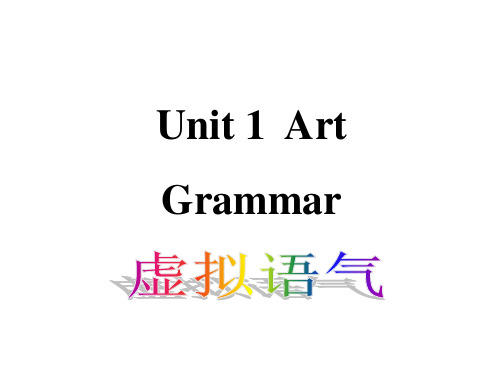
not sleep He ordered that we ____________.
4)他要求我们按时读完这本书。
should finish He demanded that we __________ the book on time.
8、虚拟语气在主语从句的使用
It is suggested / ordered / insisted / demanded / requested ·· that + S + (should) + V ·· ··
13. would rather that
did / were had done
I would rather you _____ me now. paid I would rather you ________ here than __________. went away remained I would rather you ____________ that. hadn’t done I would rather you __________ there too. had gone
6、表示愿望, 期待的虚拟语气 S + wish S did / were (that) If only S had done
1) 我要是记得他的地址就好了.
与现在相反 与过去相反
I wish that I remembered his address. If only I remembered his address.
1、当suggest译成“建议”, insist译成“坚持…做……”时, 从句用(should)
do… insist译成“坚持认为”时,从
高二英语人教版选修六讲义Unit1SectionⅢGrammar虚拟语气(1)
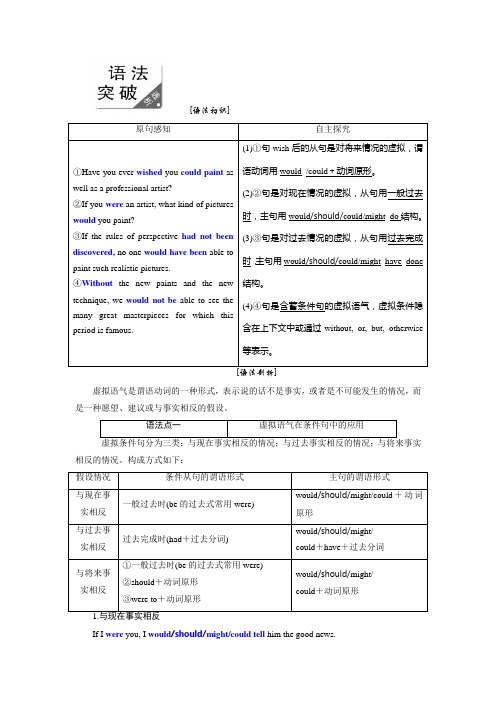
[语法初识]原句感知自主探究①Have you ever wished you could paint as well as a professional artist?②If you were an artist, what kind of pictures would you paint?③If the rules of perspective had not been discovered, no one would have been able to paint such realistic pictures.④Without the new paints and the new technique, we would not be able to see the many great masterpieces for which this period is famous.(1)①句wish后的从句是对将来情况的虚拟,谓语动词用would_/could+动词原形。
(2)②句是对现在情况的虚拟,从句用一般过去时,主句用would/should/could/might_do结构。
(3)③句是对过去情况的虚拟,从句用过去完成时,主句用would/should/could/might_have_done 结构。
(4)④句是含蓄条件句的虚拟语气,虚拟条件隐含在上下文中或通过without, or, but, otherwise 等表示。
[语法剖析]虚拟语气是谓语动词的一种形式,表示说的话不是事实,或者是不可能发生的情况,而是一种愿望、建议或与事实相反的假设。
语法点一虚拟语气在条件句中的应用相反的情况。
构成方式如下:假设情况条件从句的谓语形式主句的谓语形式与现在事实相反一般过去时(be的过去式常用were)would/should/might/could+动词原形与过去事实相反过去完成时(had+过去分词)would/should/might/could+have+过去分词与将来事实相反①一般过去时(be的过去式常用were)②should+动词原形③were to+动词原形would/should/might/could+动词原形If I were you, I would/should/might/could tell him the good news.要是我是你,我就会告诉他这个好消息。
人教版新课标 选修六 UNit 1 art Grammar 虚拟语气 if 条件句共41张
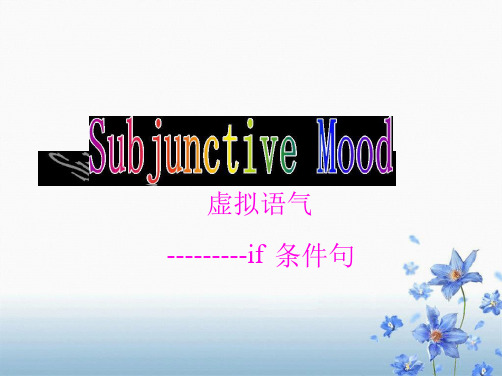
与 将来 事实相反: 从句 谓语用 _sh_o_u_l_d_+_do____________
或w__e_re__to_+_d_o____ 或__d_id__(b_e__动__词__用__w_e_r_e_) _ 主句 谓语用 _w__o_u_ld_/_co_u_l_d_/s_h_o_u_l_d_/m__ig_h_t+_d_o____
PRACTICE : Fill in the blanks
a. If there _s_h_o_u_ld__b_e (be) no natural
resource any more, we _s_h_o_u_l_d_m__a_k_e
(make) use of nuclear power . b. What _w_o_u_l_d_h_a_p_p_e_n_ (happen) if you
错综时间条件句
虚拟条件句中从句谓语动词与主句谓
语动词发生的时间__不__一__致___ ,叫做 错综 时间条件句。主句和从句的谓语动词要 依照_各__自__假__设_的__时__间__而_定__ 。
错综条件虚拟语气:主句和从句的谓语动
词要依照各自假设的时间而定。
过去
If the weather had been finer, the crops would
(marry)me tomorrow , you __c_o_u_l_d_d__o__(do) what you
like.
Practice
There are wars. People suffer
a lot.
If there _w__er_e_no wars, people__w_o_u_l_d_n_o_t_s_u_ff_era lot .
高二英语 Unit 1 Grammar 虚拟语气知识精讲 新人教版选修6
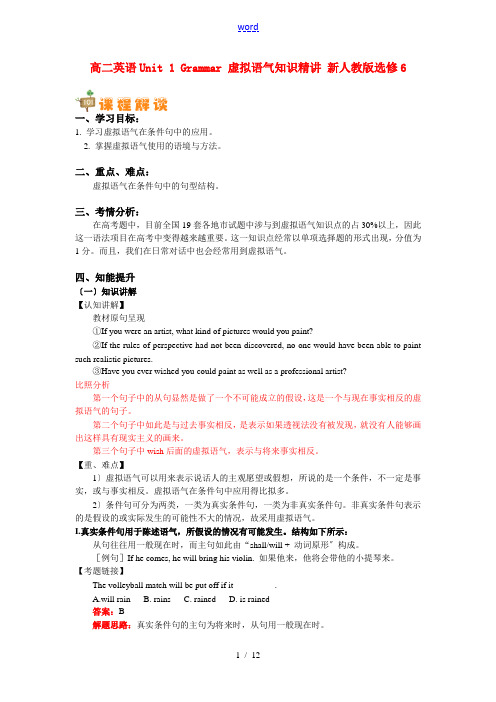
高二英语Unit 1 Grammar 虚拟语气知识精讲新人教版选修6一、学习目标:1. 学习虚拟语气在条件句中的应用。
2. 掌握虚拟语气使用的语境与方法。
二、重点、难点:虚拟语气在条件句中的句型结构。
三、考情分析:在高考题中,目前全国19套各地市试题中涉与到虚拟语气知识点的占30%以上,因此这一语法项目在高考中变得越来越重要。
这一知识点经常以单项选择题的形式出现,分值为1分。
而且,我们在日常对话中也会经常用到虚拟语气。
四、知能提升〔一〕知识讲解【认知讲解】教材原句呈现①If you were an artist, what kind of pictures would you paint?②If the rules of perspective had not been discovered, no one would have been able to paint such realistic pictures.③Have you ever wished you could paint as well as a professional artist?比照分析第一个句子中的从句显然是做了一个不可能成立的假设,这是一个与现在事实相反的虚拟语气的句子。
第二个句子中如此是与过去事实相反,是表示如果透视法没有被发现,就没有人能够画出这样具有现实主义的画来。
第三个句子中wish后面的虚拟语气,表示与将来事实相反。
【重、难点】1〕虚拟语气可以用来表示说话人的主观愿望或假想,所说的是一个条件,不一定是事实,或与事实相反。
虚拟语气在条件句中应用得比拟多。
2〕条件句可分为两类,一类为真实条件句,一类为非真实条件句。
非真实条件句表示的是假设的或实际发生的可能性不大的情况,故采用虚拟语气。
I.真实条件句用于陈述语气,所假设的情况有可能发生。
结构如下所示:从句往往用一般现在时,而主句如此由“shall/will + 动词原形〞构成。
虚拟语气
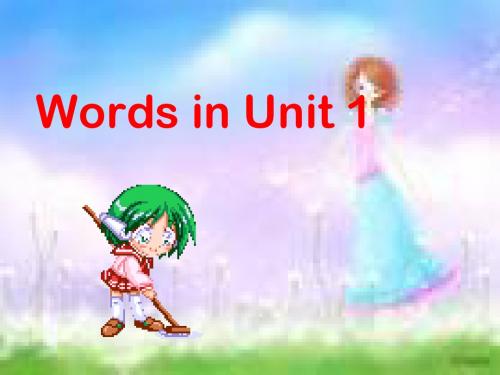
preference,
喜爱,偏爱 呼吁,求助 易碎的,脆弱的
appeal, fragile, reputation, civilization, Egypt, Egyptian, visual, fragrant,
名声,名誉
文明,文化
埃及的,埃及人
的 看得见的 香的,令人愉快 的
contemporary,
permanent,
district, committee, signature; in the flesh, appeal to
当代的,同时代的 永久的,持久的 行政区 委员会 署名,签字 或者的,本人 对---有吸引力,
abstract
adj. 抽象的,深奥的 n. 摘要 v. 摘录,提取,分离 eg: Beauty is abstract but a house is not . 美是抽象的,房子是具体的。 拓展: abstract…from… 从…中提取 in the abstract 抽象地,一般性地
6. contemporary adj. 当代 的;同时代的; eg: He has furniture of contemporary style. 他有现代款式的家具。 拓展: be contemporary with 与 … 同时代
7. signature
n. 署名; 签字;
eg: The teacher put her signature to a letter. 老师在信件上签字。
修饰不可数名词:much /little /a little / a good deal of / a great deal of / a large amount of
高中英语虚拟语气教案模板(共3篇)

高中英语虚拟语气教案模板〔共3篇〕第1篇:英语教案,虚拟语气英语教案范例〔编写:房新霞〕 Unit 1 What would you do?一.教材分析^p本单元选取了学生平日生活中经常出想的一些假设的情况,用一些非常熟悉的场景进展相应的训练。
虚拟语气对学生来说是个全新的语法,掌握好虚拟语气的用法关系到整个第一单元的学习。
所以虚拟语气的掌握对本单元的学习起着重要的作用。
要通过多层面的展示让学生进步听、说、读、写的程度。
二.学情分析^p初四的学生经过四年的学习掌握了一定的根底知识,本单元的内容对他们来说不是很难,而且本单元的内容是一些虚构的东西让他们感到很新颖,并且非常贴近生活,让学生感到亲切、真实,让他们从不同的角度去理解问题,增加学生的情感,让他们把所学到的知识运用到日常生活中。
三.教学目的1.通过本单元的学习会议论一些假设的、虚拟的情况。
2.通过本单元的学习到达如何使用虚拟语气局提出建议的目的。
3.学会表示与如今情况相反的虚拟语气。
4.学会用虚拟语气表述自己还没有实现的愿望。
四.教学重点、难点 1.重点词语:million, pimple, energetic, confident, tie, medical research2.学会运用表示如今与将来情况的虚拟条件句 If+主语+动词的过去式,主语+would+动词原形3.语言构造:If I were you, I would take a shower at first. If I had time, I would certainly go.五.教学准备利用多媒体设备,通过图片展示练习听说读写,培养学生直接用英语理解、表达和思维的才能。
安排适量的练习,让学生当堂消化。
六.教学过程Step 1 Warming up1.Ask some questions about everyday life, such as “How was your vacation?” “What kind of sports do you like?”2.Review the new words we learned yesterday.Step 2 Study the new language1.ask two questions and ask some students to answer a.Do you love money? Do you want to have a lotof money? b.If you had a lot of money, what would you do?I’d … The students may give many different answers.Then let’s listen and do 1b.Listen and number the pictures (1-4) in the order theyhear.And then ask some questions about the material.T: What did the old man do if he had amillion dollars? S: He would…T: What did the first boy do if he had a million dollars? S: He would…T: Why would he second girl put the money in the bank? S: Because she’d …T: Why would the second boy give the money to the medical research?S: Because he’d…Then make conversation according to 1a and 1b.What would you do if you had a million dollars?通过这一对话练习,让学生有节俭节约的习惯,要有爱心,把自己的钱用来帮助那些需要帮助的人,学生乐于助人。
2019-2020版英语新设计同步浙江专用版选修六讲义:Unit 1 Period Three Word版含答案
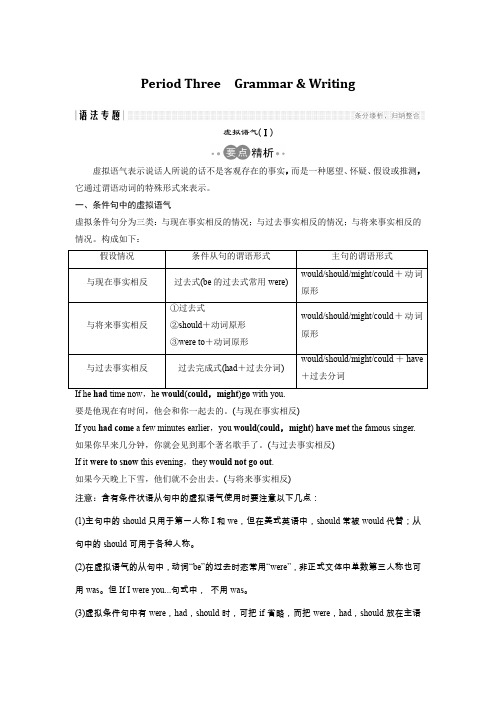
Period ThreeGrammar & Writing虚拟语气(Ⅰ)虚拟语气表示说话人所说的话不是客观存在的事实,而是一种愿望、怀疑、假设或推测,它通过谓语动词的特殊形式来表示。
一、条件句中的虚拟语气虚拟条件句分为三类:与现在事实相反的情况;与过去事实相反的情况;与将来事实相反的情况。
构成如下:要是他现在有时间,他会和你一起去的。
(与现在事实相反)If you had come a few minutes earlier ,you would (could ,might ) have met the famous singer. 如果你早来几分钟,你就会见到那个著名歌手了。
(与过去事实相反) If it were to snow this evening ,they would not go out . 如果今天晚上下雪,他们就不会出去。
(与将来事实相反) 注意:含有条件状语从句中的虚拟语气使用时要注意以下几点:(1)主句中的should 只用于第一人称I 和we ,但在美式英语中,should 常被would 代替;从句中的should 可用于各种人称。
(2)在虚拟语气的从句中,动词“be ”的过去时态常用“were ”,非正式文体中单数第三人称也可用was 。
但If I were you...句式中, 不用was 。
(3)虚拟条件句中有were ,had ,should 时,可把if 省略,而把were ,had ,should 放在主语前,用倒装结构,这种结构主要用于书面语中。
但要注意,在虚拟条件状语从句中,省略连词的倒装形式的句首不能用动词的缩略形式。
Were they here now,they could help us.=If they were here now,they could help us.要是他们现在在这儿的话,就会帮助我们了。
Should it rain,the crops would be saved.=If it should rain,the crops would be saved.假如下雨,庄稼就有救了。
Unit 1 2+虚拟语气
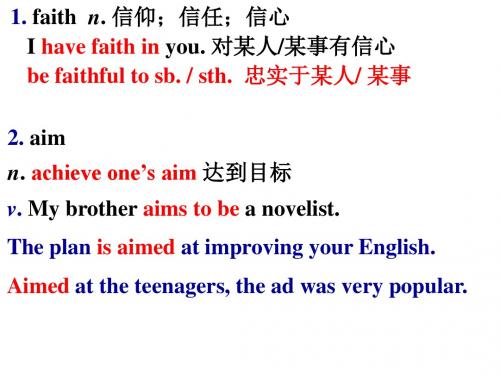
• We wish our parents wouldn’t punish us.
(未来)
现在:过去时
2)would rather that -
过去: 过去完成时
未来: 过去时 • I would rather you paid me now. (现在) • I would rather you had gone, too. (过去) • Don’t come. I would rather you came tomorrow. (未来)
Subjunctive Mood
虚拟语气在if条件句中的用法
表示说话人的愿望、假设、猜测或建议, 而不表示客观存在的事实。 If you come tomorrow, call me. If you had come, I would have told you yesterday.
If I were a child, I would be happier.
10.figure n.数字;身材;体形;人物;v.计算;认为
keep one’s figure保持体形 figure out弄懂;计算出
• 11. appeal vi. • 有吸引力 sth appeal to sb • The idea appealed to Mary.
ห้องสมุดไป่ตู้
• 呼吁,恳求 appeal to sb for sth. • He appealed to me for help.
主句和从句都与 与____ 未来 事实相反 (现在,过去,未来)
Conclusion
When
虚拟语气在if条件句中的用法
牛津高中英语选修六unit 1 语法讲解:虚拟语气
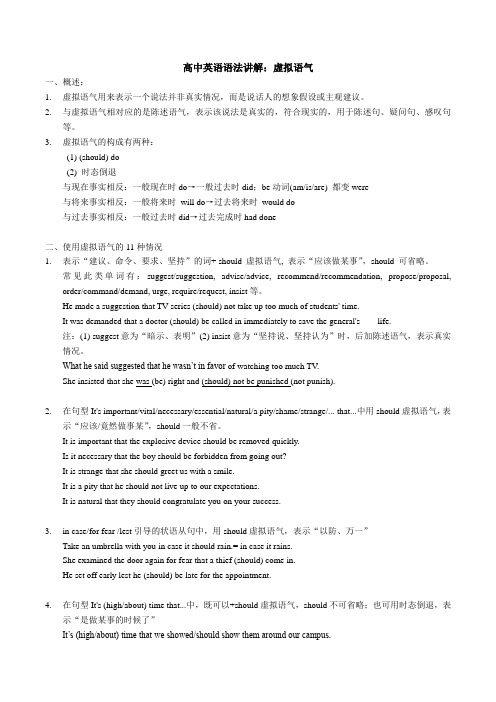
高中英语语法讲解:虚拟语气一、概述:1.虚拟语气用来表示一个说法并非真实情况,而是说话人的想象假设或主观建议。
2.与虚拟语气相对应的是陈述语气,表示该说法是真实的,符合现实的,用于陈述句、疑问句、感叹句等。
3.虚拟语气的构成有两种:(1) (should) do(2) 时态倒退与现在事实相反:一般现在时do→一般过去时did;be动词(am/is/are) 都变were与将来事实相反:一般将来时will do→过去将来时would do与过去事实相反:一般过去时did→过去完成时had done二、使用虚拟语气的11种情况1.表示“建议、命令、要求、坚持”的词+ should 虚拟语气, 表示“应该做某事”,should 可省略。
常见此类单词有:suggest/suggestion, advise/advice, recommend/recommendation, propose/proposal, order/command/demand, urge, require/request, insist等。
He made a suggestion that TV series (should) not take up too much of students' time.It was demanded that a doctor (should) be called in immediately to save the general's life.注:(1) suggest意为“暗示、表明”(2) insist意为“坚持说、坚持认为”时,后加陈述语气,表示真实情况。
What he said suggested that he wasn’t in favor of watching too much TV.She insisted that she was (be) right and (should) not be punished (not punish).2.在句型It's important/vital/necessary/essential/natural/a pity/shame/strange/... that...中用should虚拟语气,表示“应该/竟然做事某”,should一般不省。
新人教选修6 Unit1 ArtGrammar虚拟语气
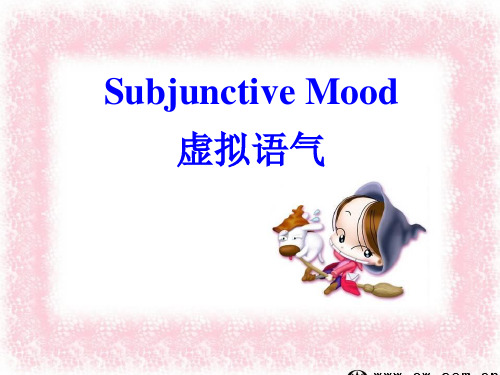
But in fact there is water on the earth.
c. If we had time now , we should (would ) read it again . In fact we don’t have time now.
d. If I were a bird, I would fly freely in the sky. But in fact I am not a bird.
The party was terrible, I wish I had never gone to it.
I wish it would rain tomorrow.
1.I wish I were a bird. Fact: I am not a bird. 2. I wish I were as tall as Yao Ming. Fact: I am not as tall as him. 3. I wish everyday were my birthday. Fact: Not everyday is my birthday. 4. I wish I hadn’t eaten so much watermelon. Fact: I ate/have eaten so much watermelon. 5. The party was terrible. I wish I had never gone there. Fact: I went to the party. 6. I wish it would rain tomorrow.
were to do should do
主句 +would/should/ could/might+ do
新教材高一必修一英语u1知识点
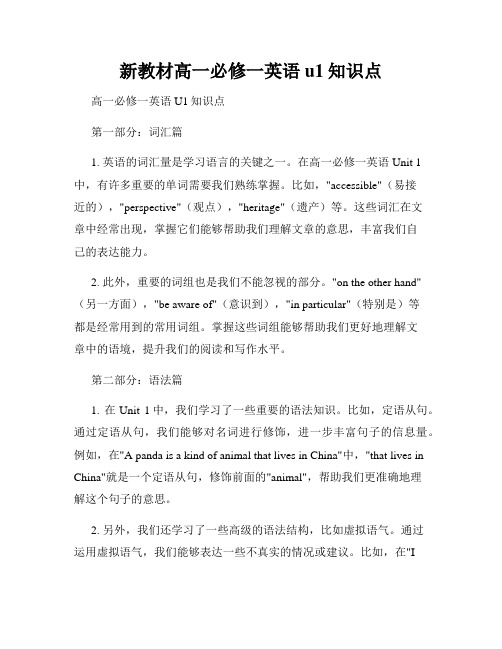
新教材高一必修一英语u1知识点高一必修一英语U1知识点第一部分:词汇篇1. 英语的词汇量是学习语言的关键之一。
在高一必修一英语Unit 1中,有许多重要的单词需要我们熟练掌握。
比如,"accessible"(易接近的),"perspective"(观点),"heritage"(遗产)等。
这些词汇在文章中经常出现,掌握它们能够帮助我们理解文章的意思,丰富我们自己的表达能力。
2. 此外,重要的词组也是我们不能忽视的部分。
"on the other hand"(另一方面),"be aware of"(意识到),"in particular"(特别是)等都是经常用到的常用词组。
掌握这些词组能够帮助我们更好地理解文章中的语境,提升我们的阅读和写作水平。
第二部分:语法篇1. 在Unit 1中,我们学习了一些重要的语法知识。
比如,定语从句。
通过定语从句,我们能够对名词进行修饰,进一步丰富句子的信息量。
例如,在"A panda is a kind of animal that lives in China"中,"that lives in China"就是一个定语从句,修饰前面的"animal",帮助我们更准确地理解这个句子的意思。
2. 另外,我们还学习了一些高级的语法结构,比如虚拟语气。
通过运用虚拟语气,我们能够表达一些不真实的情况或建议。
比如,在"Iwish I were a bird"中,使用了虚拟语气来表达自己希望成为鸟的愿望,但事实上并不是真实的情况。
第三部分:阅读篇1. 在Unit 1的阅读部分,我们阅读了一篇名为"Great writers"的文章。
通过阅读该文章,我们能够了解一些伟大作家的生平及其对世界文学的影响。
- 1、下载文档前请自行甄别文档内容的完整性,平台不提供额外的编辑、内容补充、找答案等附加服务。
- 2、"仅部分预览"的文档,不可在线预览部分如存在完整性等问题,可反馈申请退款(可完整预览的文档不适用该条件!)。
- 3、如文档侵犯您的权益,请联系客服反馈,我们会尽快为您处理(人工客服工作时间:9:00-18:30)。
The Subjunctive Mood一.虚拟条件句1.基本形式:1)与现在事实相反的虚拟语气:从句:past tense (过去时)主句:would/should/could/might + 动词原形eg. If you and your wife lost your jobs, what would you do?2)与将来事实相反的虚拟语气:从句:past tense (过去时)/ should + 动词原形/ were to + 动词原形主句:would/should/could/might + 动词原形eg. If you came tomorrow/If you were to come tomorrow, I would have time to meet you.3)与过去事实相反的虚拟语气:从句:had + past participle(过去完成时)主句:would/should/could/might + have + past participleeg. If the whole operation had not been planned before hand, a great deal of time and money would have been lost.2.助动词等提前的虚拟条件句:在if 条件句中,若谓语中含有were/had/should 时,可省去句首的if,而将此三词提至句首,构成倒装。
eg. 1. If I were in your position, I would go.---- Were I in your position, I would go.2. If they had not helped us, our experiments would have failed.---- Had they not helped us, our experiments would have failed.---- Hadn’t they helped us, our experiments would have failed.3. If they were to arrive before we depart the day after tomorrow, we should have awonderful dinner party.---- Were they to arrive before we depart the day after tomorrow, we should have a wonderful dinner party.4. I f she should leave right now, she would get there on Sunday.---- Should she leave right now, she would get there on Sunday.3.含蓄虚拟条件句:1)句中含有with (如果有了),without(要是没有)时,隐含与过去事实相反。
eg. 1. Jim could have won the competition, with a little more training.2. Without solid industry foundation, the changes would not have taken place in myhometown.2)句中含有but for/but that/save that (要不是,倘若没有)时,隐含虚拟,规则同if 条件句的三种情况。
eg. 1. But for the heat of the sun, nothing could live.2. But for the fog, we should have reached our destination in time.4.错综时间条件句1)主从句动作发生的时间不一致:一个与现在事实或将来事实相反,另一个与过去事实相反。
eg. If I hadn’t stood under the ladder to catch you when you fell, you would not be smiling now.2)虚拟语气与陈述语气混用:一部分为虚拟情况,另一部分为真实情况。
eg. I would have gone there, but I had no time.二.虚拟语气在其他从句中的使用1.在wish, would rather/would sooner 引导的宾语从句中须用虚拟语气。
1). 与现在事实相反,谓语用过去时。
eg. 1. I wish I were eighteen years old.2. To be frank, I would rather you were not involved in the case.2). 与过去事实相反,谓语用过去完成时。
eg. 1. I wish I had gone to see the football match last night.2. To be frank, I would rather you had not been involved in the case.3). 与过去事实相反,谓语用would/could/might + 动词原形。
eg. 1. I wish he could stay with me in the future days.2. To be frank, I would rather you would not be involved in the case.2.在as if/as though, otherwise/or 引导的状语从句中须用虚拟语气,规则同if 条件句的三种情况。
eg. 1. He talked about it as if he had seen it in his own eyes.2. I didn’t know his telephone number, otherwise I had phoned him.3.由lest/for fear that/in case (万一,以防,唯恐)引导的状语从句中须用(should)+动词原形表虚拟。
eg. 1. All the men here carry guns with them for fear that the wild animals (should) attract them.2. I kept this seat for him in case he (should)change his mind.4.在if only (要是……就好了,但愿)引导的从句中须用虚拟语气,规则同if 条件句的三种情况。
eg. 1. If only that photograph were not missing.2. If only I could see him again.3. If only the letter had arrived earlier.5.It’s high/right/about time (that) 从句中须用过去时表虚拟。
eg. 1. Don’t you think that it’s about time (that) we went home.2. It’s high time (that) such practices were ended.6.某些表示建议,要求,命令等意义的动词后的宾语从句或者某些表示建议,要求,命令等意义的名词后的表语从句中须用(should)+动词原形表虚拟。
表示要求,请求的常用词:ask, beg, plead, demand, request, require, insist, maintain(坚持意见,固执己见),oblige(以法律,义务等强迫,迫使)等;表示建议的常用词:advise, move (formal) (正式地提出,提议),vote(提议,建议),propose, suggest, recommend 等;表示命令的常用词:command, order, direct (formal) (指示,命令),stipulate (formal) (明确要求,规定),decree (裁定,裁决,颁布),dictate(指使,强行规定)等;表示愿望的常用词:desire, prefer 等;表示决定的常用词:decide, determine, resolve(决心,决定+ on )等。
eg. 1. He suggested we (should) go to tomorrow’s exhibition together.2. The police ordered that parking (should) be prohibited on Hongshan Street during therush hours.3. In the past, men generally preferred that their wives (should) work in the home.4. It is decided that no smoking (should) be allowed in the classroom.5. Tom’s father asks he (should) stay in New York for a few days more.7.在句型It’s + adj. + that clause 中,常用(should)+动词原形表虚拟。
常用的形容词有:possible, urgent, necessary, important, essential, better, advisable,appropriate, compulsory(强制的),concerned, crucial, desirable, imperative(绝对必要的),natural, reasonable, vital(致命的),obligatory(必须履行的),preferable, surprise, dreadful(可怕的),wonderful, strange, keen 等。
注意事项:当不能确定与将来事实相反或与现在事实相反时,我们倾向于后者;在if 条件句的从句中,从句的时态一般是在与事实相反的时态上倒退一个时态;与现在事实相反和与将来事实相反的主,从句模式基本一致。
